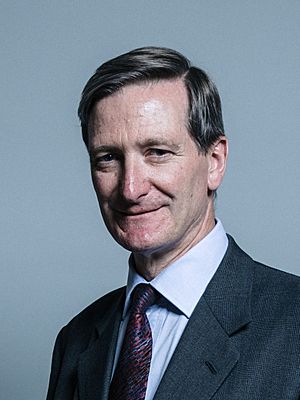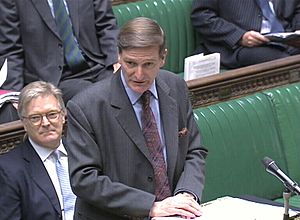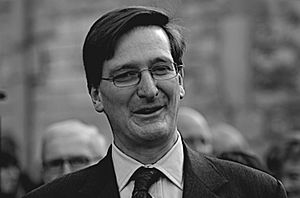Dominic Grieve facts for kids
Quick facts for kids
Dominic Grieve
|
|||||||||||||||||||||||||||||||||||
|---|---|---|---|---|---|---|---|---|---|---|---|---|---|---|---|---|---|---|---|---|---|---|---|---|---|---|---|---|---|---|---|---|---|---|---|

Official portrait, 2017
|
|||||||||||||||||||||||||||||||||||
| Chair of the Intelligence and Security Committee | |||||||||||||||||||||||||||||||||||
| In office 15 September 2015 – 6 November 2019 |
|||||||||||||||||||||||||||||||||||
| Preceded by | Sir Malcolm Rifkind | ||||||||||||||||||||||||||||||||||
| Succeeded by | Julian Lewis | ||||||||||||||||||||||||||||||||||
| Attorney General for England and Wales Advocate General for Northern Ireland |
|||||||||||||||||||||||||||||||||||
| In office 12 May 2010 – 15 July 2014 |
|||||||||||||||||||||||||||||||||||
| Prime Minister | David Cameron | ||||||||||||||||||||||||||||||||||
| Preceded by | The Baroness Scotland of Asthal | ||||||||||||||||||||||||||||||||||
| Succeeded by | Jeremy Wright | ||||||||||||||||||||||||||||||||||
|
|||||||||||||||||||||||||||||||||||
| Member of Parliament for Beaconsfield |
|||||||||||||||||||||||||||||||||||
| In office 1 May 1997 – 6 November 2019 |
|||||||||||||||||||||||||||||||||||
| Preceded by | Tim Smith | ||||||||||||||||||||||||||||||||||
| Succeeded by | Joy Morrissey | ||||||||||||||||||||||||||||||||||
| Personal details | |||||||||||||||||||||||||||||||||||
| Born | 24 May 1956 Lambeth, London, England |
||||||||||||||||||||||||||||||||||
| Political party | Independent (2019–) | ||||||||||||||||||||||||||||||||||
| Other political affiliations |
Conservative (until 2019) | ||||||||||||||||||||||||||||||||||
| Spouse |
Caroline Hutton
(m. 1990) |
||||||||||||||||||||||||||||||||||
| Children | 2 | ||||||||||||||||||||||||||||||||||
| Education | Westminster School | ||||||||||||||||||||||||||||||||||
| Alma mater | Magdalen College, Oxford, University of Westminster | ||||||||||||||||||||||||||||||||||
Dominic Charles Roberts Grieve (born May 24, 1956) is a British lawyer and former politician. He is known for his work as a Member of Parliament (MP) and for his legal roles.
Mr. Grieve served as the MP for Beaconsfield from 1997 to 2019. He also held important positions like the Attorney General for England and Wales, which is a chief legal advisor to the government. From 2015 to 2019, he was the Chair of the Intelligence and Security Committee of Parliament, overseeing the UK's spy agencies.
He was a member of the Conservative Party for many years. However, he was later removed from the party in 2019. He then ran as an independent candidate in the 2019 general election but did not win his seat. Mr. Grieve was a strong supporter of the UK remaining in the European Union (EU). He often spoke out about Brexit, even when his views differed from the government's plans.
Contents
Early Life and Education
Dominic Grieve was born in Lambeth, London. His father, Percy Grieve, was also a Member of Parliament. His mother was of Anglo-French background.
He attended several schools, including the Lycée français Charles de Gaulle and Westminster School. He then went to Magdalen College, Oxford, where he studied Modern History. He earned his degree in 1978. While at Oxford, he was the President of the Oxford University Conservative Association.
After Oxford, Mr. Grieve continued his studies at the Polytechnic of Central London (now the University of Westminster). He received a Diploma in Law in 1979.
Legal Career
Dominic Grieve became a barrister in 1980. A barrister is a type of lawyer who represents clients in court. He specialized in law related to workplace safety and health.
Political Journey
Local Council Work
Mr. Grieve started his political career at a local level. In 1982, he was elected as a councillor in the London Borough of Hammersmith and Fulham. He served in this role until 1986.
He also ran for a seat in Parliament in the 1987 general election. He stood for the Norwood constituency but did not win.
Becoming a Member of Parliament
Dominic Grieve was first elected to the House of Commons in 1997. He became the MP for Beaconsfield, a constituency in Buckinghamshire. He won with a large number of votes. He continued to serve as the MP for Beaconsfield until 2019.
During his time as an MP, he was part of several important committees. He also held different roles within the Conservative Party. He was a spokesman on Scottish affairs and later on criminal justice. In 2003, he became the Shadow Attorney General. This meant he was the main opposition party's legal spokesperson.
In 2008, he was appointed Shadow Home Secretary. This role involves overseeing matters related to national security and law enforcement. He played a key part in stopping a government proposal in 2006. This proposal would have allowed suspected terrorists to be held for up to 90 days without charge.
In 2009, he became the Shadow Justice Secretary. This role focuses on the justice system.
Attorney General Role
After the 2010 general election, Dominic Grieve was appointed Attorney General. This is a very important legal role in the government. He was also made a member of the Privy Council.
In 2014, Prime Minister David Cameron removed Mr. Grieve from his role as Attorney General. The exact reason was not given.
Leaving the Conservative Party
In September 2019, Dominic Grieve was one of 21 Conservative MPs who voted against the government. This vote was about preventing a "no-deal Brexit." Because they voted against the government, these MPs were removed from the Conservative Party. This meant they had to sit in Parliament as independent MPs.
Mr. Grieve decided to run for re-election as an independent candidate in Beaconsfield. Other parties, like the Liberal Democrats, chose not to run a candidate against him. This was to give him a better chance of winning. However, he lost his seat in the 2019 general election.
Views on Brexit
Dominic Grieve was against Brexit before the 2016 referendum. He believed the UK should remain in the European Union.
During the Brexit process, he often proposed changes to the government's plans. He wanted Parliament to have a "meaningful vote" on any Brexit deal. This meant that Parliament's decision would be binding on the government. He also pushed for a second public vote on Brexit.
He believed that leaving the EU without a deal would be very damaging. He even said he would support efforts to bring down a Conservative government if it was the only way to stop a "catastrophic" no-deal Brexit. His strong views on Brexit led to disagreements with his local party members.
Personal Life
Dominic Grieve is a practicing Anglican, which means he is a member of the Church of England. He was part of the London diocesan synod for six years.
He married Caroline Hutton, who is also a barrister, in 1990. They have two sons.
His hobbies include canoeing, boating on the Thames, mountain climbing, skiing, and fell walking. He also enjoys architecture, art, and travel. For six years, he volunteered as a police station lay visitor. He also worked with groups in Brixton to help different communities after the riots there.
Mr. Grieve is a supporter of Prisoners Abroad. This charity helps British citizens who are imprisoned in other countries and their families.
Honours and Awards
Commonwealth Honours
| Country | Date | Appointment | Post-nominal letters | Honorific |
|---|---|---|---|---|
| 9 June 2010 | Member of His Majesty's Most Honourable Privy Council | PC | The Right Honourable | |
| 22 November 2004 | Master of the Bench at Middle Temple | |||
| 28 March 2008 | Queen's Counsel | QC/KC |
Foreign Honours
| Country | Date | Appointment | Post-nominal letters | Class |
|---|---|---|---|---|
| 2016 | Legion of Honour | Chevalier |
Scholastic Honours
| Location | Date | School | Position |
|---|---|---|---|
| 3 June 2020 – Present | Goldsmiths, University of London | Visiting Professor |
Honorary Degrees
| Location | Date | School | Degree | Gave Commencement Address |
|---|---|---|---|---|
| August 2021 | University of Westminster | Doctor of Letters (D.Litt.) | Yes | |
| 26 July 2022 | Kingston University | Doctorate | Yes |
 | Audre Lorde |
 | John Berry Meachum |
 | Ferdinand Lee Barnett |



